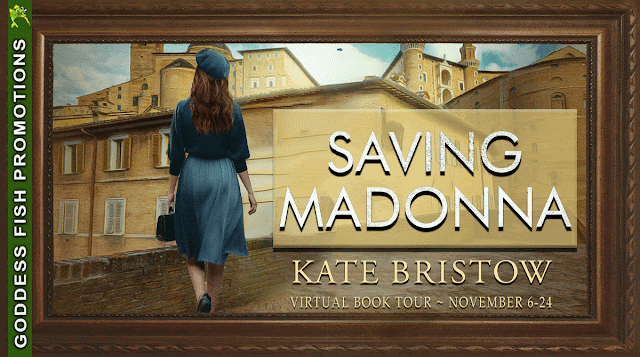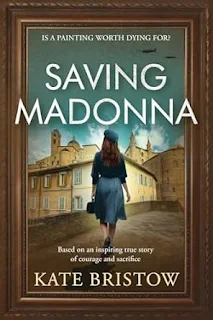Saving Madonna
by Kate Bristow
~~~~~~~~~~~~~
GENRE: Historical Fiction
~~~~~~~~~~~~~
BLURB: Is a painting worth dying for?
Inspired by real events, an unforgettable story of love, courage and sacrifice to save a country’s heritage.
Italy 1943. As the Allies bomb Milan, Elena Marchetti reluctantly gives up her coveted job as an art curator in the city to return to her family farm near Urbino. She takes up a new role assisting Pasquale Rotondi, the Superintendent of Arts in the region, in protecting works of art from all over Italy that have been hidden in the relative safety of the countryside.
At a family celebration, Elena reunites with Luca, a close childhood friend. A shattering event instigated by the occupying Germans deepens their relationship, and they start planning a life together. When rumours surface that Italy’s art is being stolen by the German occupiers, Pasquale hatches an audacious plan to rescue the priceless paintings in his possession. Elena and Luca are forced to make an impossible decision: will they embark on a dangerous mission to save Italy’s cultural heritage?
~~~~~~~~~~~~~
EXCERPT
Marco looked
beyond his home to a small wood that stretched out from the rear of the
property down to the narrow white road snaking through the valley toward the
distant hilltop town of Peglio. His home was called Ca’Boschetto (House of the
Copse) because of these trees, and Marco knew it would soon be time for his
father and uncle to gather their friends and bloodhounds for the annual truffle
hunt. Their small wood was known far and wide as a fruitful location for the
illusive and highly sought-after fungi, and the truffle hunt was one of the highlights
of the season.
Beyond the wood, a patchwork of fields that had been parched brown after the harvest in the heat of August was beginning to turn into shades of green from recent rain. Marco spotted a couple of deer making the most of the fresh grass. Something else caught his eye as it glinted in the distance. Marco lifted his hands to his brow to deflect the glare of the autumnal sun. Whatever was flashing in the sunlight was moving toward their farm. The ox-drawn carts that often made this journey on the back road couldn’t move that quickly. He squinted. Something was not right.
“Luca! Luca! I can see a car coming. Look at the road!”
His older brother turned away from the flock and walked over to where Marco was standing. Luca stared at the distant vehicle for a minute and his face darkened. “Marco, Gianni, run down to the house and tell Papà that there might be Germans coming. Move!”
~~~~~~~~~~~~~
Does history matter?
When I tell certain people that I have written a historical fiction book, I can see their eyes glaze over. “Oh history’s not really my thing,” some say. Others prefer to let me down gently, describing in an excited voice why they adore romance or mysteries or crime stories. History seems to be losing popularity everywhere you look. Universities have started limiting or in some cases cutting history courses, preferring to offer ‘useful’ degrees like computer science or data analysis. Increasingly it is seen as an easy win for politicians and school boards to cut funding for any type of liberal arts education in favor of classes that will more directly help students get good paying jobs in the real world.
So why study history? Or in my case write about it? Is it really that important to learn about how people lived in the past or the events that happened decades or centuries before you were born? I happen to believe that history could well be the most important subject to study if you want to understand what is happening in your world and your place within it.
“Those that fail to learn from history are doomed to repeat it” as Winston Churchill famously remarked. Without understanding events of the past we are unlikely to be able to learn from our successes or failures. As children we tend to repeat mistakes over and over until we begin to realize that we will be better off if we stop touching the hot oven or putting too much hot sauce on our food. (Admittedly I am still prone to the latter.) Studying history allows us to see what mistakes our ancestors made so that hopefully we can avoid the same catastrophes.
Usually, rather than reading dense history books, I enjoy losing myself in a well written and researched historical novel instead. ‘Wolf Hall’ by Hilary Mantel got me intrigued about the life of Thomas Cromwell and the court of Henry VIII. ‘Half Of A Yellow Sun’ by Chimamanda Ngozi Adichie sent me down a Google rabbit hole searching for more information on the Biafran War. If we can see ourselves reflected in characters living in different times and in different countries yet facing familiar issues and situations, it helps us understand on a visceral level just how much all of us have in common.
My novel ‘Saving Madonna’ is not only about events that happened eighty years ago, but also about something that is still happening today. In Italy during WW2, museum curators and regular Italians risked everything to save priceless works of art from the occupying Germans, who has been tasked by Hitler to steal whatever they could find. The Italians realized that if the art was allowed to disappear, an important part of their culture and identity would be lost as well. We are seeing the same struggles play out this decade in places like Ukraine, Syria and Iraq. I read a newspaper article recently about the courage of Ukrainian museum curators who have been risking their lives to move or hide works of art to save them from the Russian forces intent on stealing them. “Behind (Russian) tactics is a fight against our identity,” said Oleksandr Tkachenko, the Ukrainian Culture Minister. Substitute German for Russian and that’s a statement my protagonist Pasquale Rotondi, based on a real person, would have identified strongly with.
History isn’t static either. New facts come to light. The original narrators are found to be flawed in their telling of it. Inconvenient truths are ignored or glossed over. Learning new information or telling the story from a fresh perspective can cast new light on something we thought we knew. The nonfiction book ‘Monuments Men’ told the story of the American and British art historians recruited into the Allied forces to help rescue Europe’s art at the end of WW2. It was turned into a thrilling movie starring George Clooney. History tends to be told by the victors. But my story starts two years earlier and is based on events during the war. Without the actions of many brave Italians, there would have been little art left in Italy by the end of the war for the Allies to ‘save’. It matters that we keep telling the stories so that we can try to see the whole picture.
~~~~~~~~~~~~~
AUTHOR Bio and Links:
Kate Bristow was born in London. She fell in love with reading when she got her first library card at the age of four. Her first attempt at writing and publishing for a wide audience was a local newspaper typed laboriously at home on her mother’s typewriter while at primary (elementary) school in north London. It is surely a loss to cutting-edge journalism that only one issue was ever produced. Kate divides her time between her small but perfectly formed modern home in Los Angeles and her five-hundred-year-old farmhouse just outside Sassocorvaro in Italy.
Author Links:
Website: https://www.katebristow.com
Facebook:
https://www.facebook.com/katebristowauthor/
Instagram: https://www.instagram.com/katebristowauthor/
Universal Buy Link: https://1link.st/katebristow
~~~~~~~~~~~~~
GIVEAWAY INFORMATION and RAFFLECOPTER CODE
Kate Bristow will be awarding a $25 Amazon/BN GC to a randomly drawn winner via rafflecopter during the tour.
RAFFLECOPTER:








7 Comments
Thank you for hosting today - we appreciate it.
ReplyDeleteYou are welcomed.
DeleteWhat is your favorite space to do your writing?
ReplyDeleteI have a small bedroom at the front of my single story house that I have turned into an office. It looks out onto the street so I can watch the world go by while I work.
DeleteThank you so much for having me today - I really enjoyed writing about history for your blog!
ReplyDeleteYou are most welcomed, Kate. Hosting your book was such a pleasure.
DeleteFascinating subject. Knowing about history helps us to understand the future. Unfortunately, wars are still raging so we do not seem to learn. Can I throw in a question? It's a bit sexist - WARNING! Do you think that if there were more female politicians, there would be fewer or no wars? Good luck with your book and thank you for this interview.
ReplyDelete